News
6 billion baht Ashton Asoke condo in Bangkok to be demolished
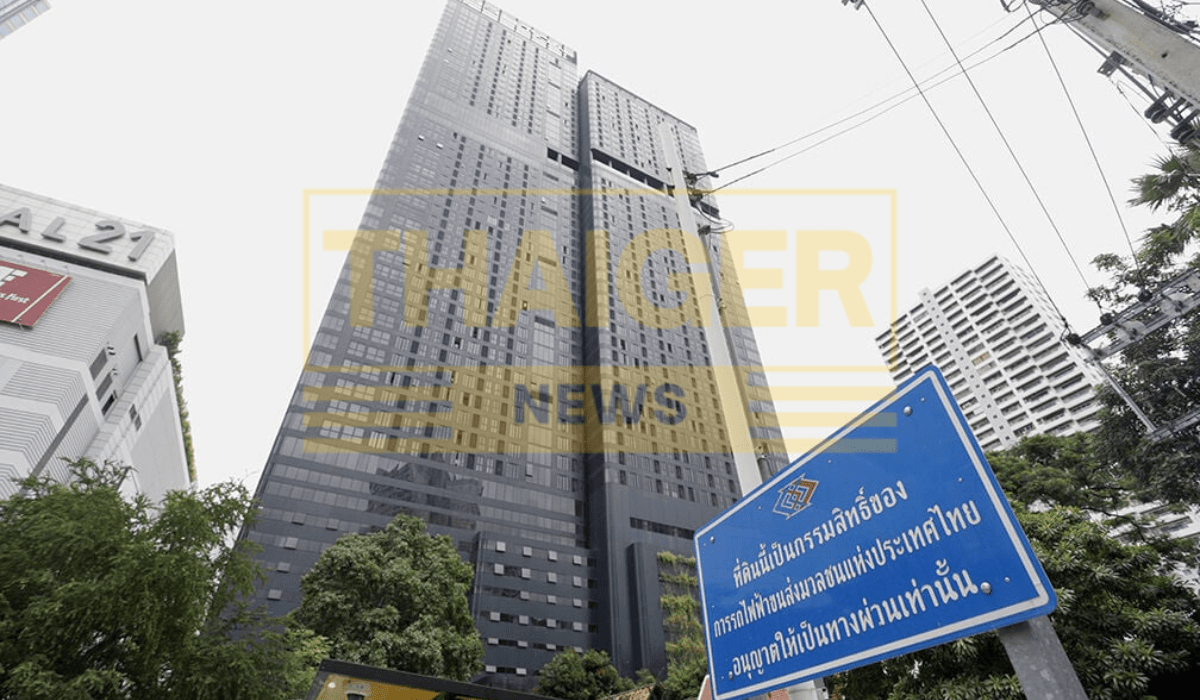
In a surprising turn of events, plans have been announced for the demolition of the prestigious Ashton Asoke condominium complex in Bangkok, Thailand. This upscale development, valued at 6 billion baht, has been a prominent landmark in the city’s skyline, but its fate now hangs in the balance as discussions unfold regarding its future. This article delves into the reasons behind this decision, its potential implications, and the anticipated developments in the wake of this announcement.
The Ashton Asoke Condo: A Symbol of Luxury
The Ashton Asoke condo, situated in the heart of Bangkok’s bustling business district, has long been synonymous with luxury living. Boasting state-of-the-art amenities, exquisite design, and panoramic views of the cityscape, it has attracted discerning buyers seeking opulent residences in a prime location. With its sleek architecture and high-end facilities, the condominium has garnered acclaim as one of Bangkok’s premier residential developments.
Reasons for Demolition
The decision to demolish the Ashton Asoke condo comes as a surprise to many, given its esteemed status in the real estate market. However, several factors have contributed to this unexpected development. One primary reason cited is the need for extensive renovations to address structural issues and modernize the building’s infrastructure. Over time, wear and tear have taken a toll on the condo’s facilities, necessitating significant upgrades to ensure the safety and comfort of residents.
Another factor driving the decision is the evolving landscape of Bangkok’s real estate market. With new developments springing up across the city, competition has intensified, prompting property developers to reevaluate existing projects and explore innovative opportunities. In this context, the demolition of the Ashton Asoke condo presents an opportunity to reimagine the site and capitalize on emerging trends in urban living.
Implications for Residents and Investors
The announcement of the condo’s demolition has naturally raised concerns among current residents and investors. Many residents have invested substantial sums in their units, expecting to enjoy the luxurious amenities and prestige associated with the Ashton Asoke brand. For them, the prospect of relocation or uncertainty regarding future arrangements looms large, raising questions about compensation, alternative accommodations, and the timeline for the demolition process.
Similarly, investors who have purchased units in the condominium as part of their real estate portfolio are now confronted with the prospect of potential losses or diminished returns on their investment. The decision to demolish the condo has undoubtedly disrupted their financial plans and prompted a reassessment of their investment strategies in the Bangkok property market.
While the decision to demolish the Ashton Asoke condo marks the end of an era for this iconic development, it also signals the beginning of a new chapter in Bangkok’s urban landscape. Developers and stakeholders are already exploring various possibilities for the site, ranging from redeveloping it into a mixed-use complex to constructing a new residential or commercial project.
One possibility under consideration is the creation of a modern, sustainable development that reflects the evolving needs and preferences of urban dwellers. Concepts such as green spaces, smart technology integration, and community-centric design are likely to feature prominently in future plans, aligning with global trends in urban development and sustainability.
The decision to demolish the 6 billion baht Ashton Asoke condo in Bangkok marks a significant milestone in the city’s real estate history. While it may come as a surprise to many, it underscores the dynamic nature of the property market and the imperative for adaptation and innovation in the face of changing circumstances. As discussions unfold regarding the site’s future, stakeholders must navigate the complexities of relocation, investment, and urban planning to ensure a smooth transition and create a vibrant, sustainable community for the future.
News
Pickup truck crash in Lampang kills one amid heavy rain
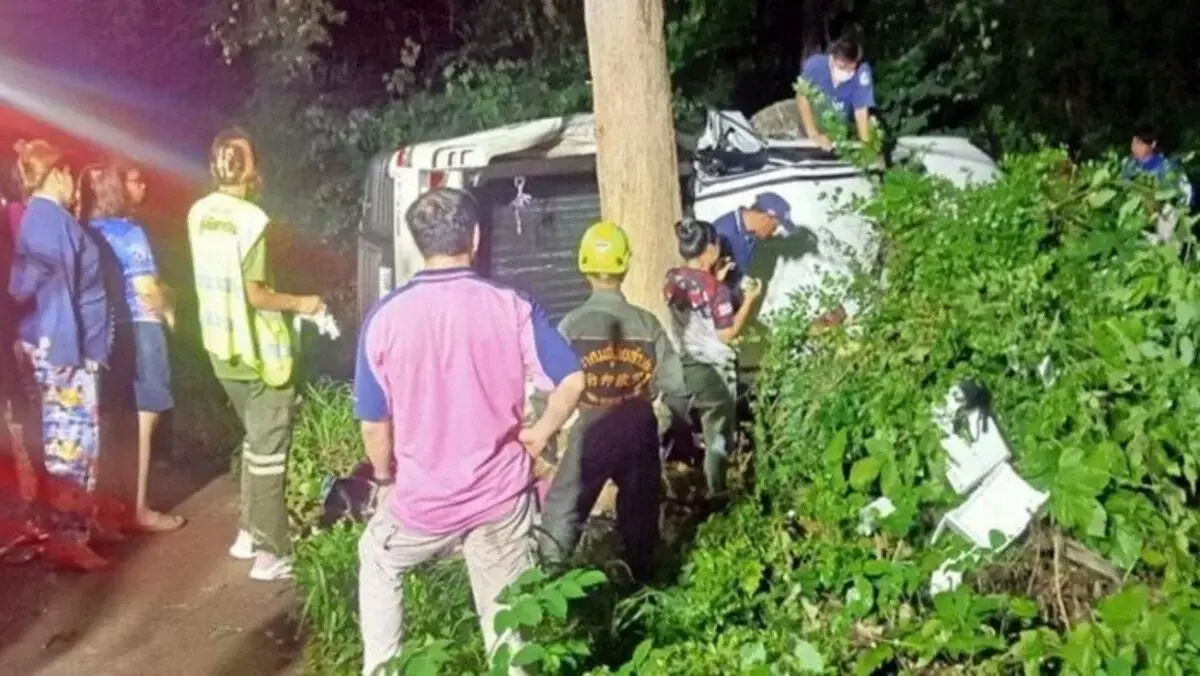
Due to heavy rain, a pickup truck returning from Chiang Mai skidded off the road and crashed into a tree in Thoen, Lampang.
Despite the efforts of rescue teams, a 50-year-old woman tragically lost her life.
The accident was reported to Thoen Police Station in Lampang at 6:50 PM yesterday, July 30.
The incident occurred on Phahonyothin Road, between kilometer markers 632 and 633, near the Mae Thot intersection in Thoen district.
Rescue units from Mae Thot, Lampang, Thoen, and Ombun Thoen were promptly dispatched to the scene.
Related News: Police arrest violent
Upon arrival, responders discovered a white, four-door Mazda pickup truck with a Surin registration overturned and severely damaged from colliding with a large roadside tree. Inside the vehicle, four injured individuals were trapped.
Rescue teams quickly extracted three injured and provided initial medical assistance before transferring them to a hospital.
However, a 50-year-old woman from the Na Pang subdistrict, Phu Phiang district, Nan province, who was seated in the back, sustained critical injuries and succumbed to them before she could be freed from the wreckage.
Initial investigations revealed that the group had traveled from Chiang Mai to Nakhon Pathom.
The accident occurred on a curved section of the road, worsened by wet and slippery conditions from the rain.
The vehicle lost control and crashed violently into the tree.
After extracting and treating the injured, the deceased’s body was transported to the hospital for further examination.
Police have launched a formal investigation into the accident. They are gathering evidence and statements from the injured to understand the exact circumstances leading to the crash.
The results of the investigation will guide necessary legal proceedings, reported KhaoSod.
Authorities advised.
“We urge all drivers to exercise extreme caution, especially in bad weather and on curved roads.”
News
Police arrest violent debt collector after tip-off in Bangkok

Police apprehended a member of a violent debt collection gang linked to the assault of a 73-year-old woman following a tip-off. He was caught while attempting to flee from a motel on the outskirts of Bangkok.
High-ranking police officials, including Thiti Sangsawang, Noppasin Poolsawat, and Thiradech Thamsuthee, along with a team of investigators, successfully arrested Kritchit, also known as 33-year-old Chit Thasala, from Nakhon Si Thammarat Province today, July 30.
He is one of the three members of the gang responsible for violent debt collection activities, including physical assault, intimidation, kicking doors, cutting off electricity, and locking debtors inside their homes.
The Min Buri Criminal Court issued an arrest warrant for Kritchit on July 23 for operating an unauthorized personal loan business, charging excessive interest, and threatening debt collection practices.
Related News: Thai vendor denies
He was apprehended at a hotel in the Saphan Sung district as he tried to escape in his car. During interrogation, Kritchit denied all charges, stating he had only completed Grade 9 and initially worked as a fruit farmer in Phuket’s Thalang District. In 2022, he sold his orchard land and used the proceeds to start a money-lending business.
He collaborated with two other suspects, Ta and Khet, who are still at large, to lend money in the Min Buri, Ram Inthra, Rom Klao, and On Nut areas.
They charged an interest rate of 20% daily, with borrowers typically taking out 5,000 to 6,000 baht loans. Kritchit claimed that Ta and Khet were responsible for using violence against the debtors on the day of the incident.
“I only worked with Ta and Khet to lend money. They were the ones who used violence.”
However, police remain skeptical of his testimony. Investigations revealed that Kritchit is romantically involved with the younger sister of Kenwit, another gang member who was previously arrested for assaulting the older woman.
Kenwit’s gang had attacked the 73-year-old in the Chokchai area. After receiving a tip-off, Kritchit fled to the hotel, where he was captured.
Police have transferred Kritchit to the Min Buri Police Station for further legal proceedings. His capture is a significant breakthrough in the ongoing crackdown against violent debt collection gangs operating in Bangkok and nearby areas.
As one of the lead investigators remarked, we are committed to cracking down on these illegal activities and ensuring the safety of our citizens.
Kritchit’s case will proceed through the legal system, and police are continuing their search for the remaining gang members, Ta and Khet. The investigation remains ongoing, with police hopeful that further arrests will follow, dismantling the entire network of violent debt collectors, reported Khaosod.
News
Thai vendor denies assault, cites stress from poor sales
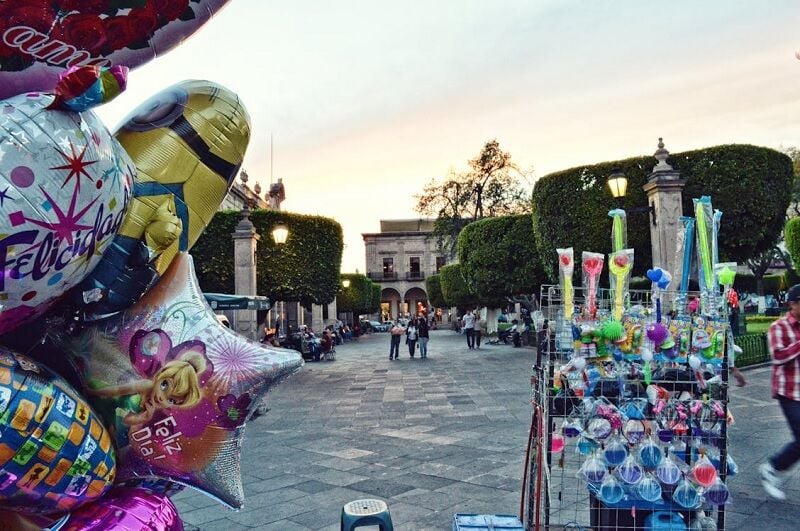
A Thai grilled squid vendor turned himself in and expressed remorse after allegedly striking a Pattaya city official who requested him to move his sidecar motorcycle from obstructing traffic.
The vendor, however, denied the physical assault, citing stress from poor sales as the trigger for the incident. He claimed their encounter was limited to a verbal disagreement and a shirt tug.
Pattaya police yesterday, July 29, invited Siwachett Nakham, a 42-year-old former temporary employee at the government’s Public Works Department and a current grilled squid vendor, to meet with an investigator to address the dispute.
Related News: Legend enjoys spring
The altercation involved Siwachett and a 40-year-old Pattaya city official, Udon Woranam, who had requested Siwachett to move his vehicle, blocking traffic near Jomtien Beach in front of the Dongtan Police Box. Siwachett was accused of punching Udon after the latter politely asked him to move his motorcycle. Siwachett, who acknowledged being the person in the video, denied the physical assault, maintaining that he only had a verbal confrontation with Udon and tugged his shirt.
He cited stress from poor sales and financial burdens as the reasons behind his behavior.
“I did not intend to harm Mr Udon because I had worked with the Public Works Department before, so I knew hitting an official was a bad idea.”
Siwachett apologized for his actions, and Udon said he did not wish to pursue the matter further. Despite this, Pattaya City insisted on taking legal action against the vendor to set a precedent and deter similar future incidents.
Selling goods
Additionally, Udon advised other vendors to remain calm, control their emotions, and adhere to the designated areas for selling their goods according to the law.
Following resolving this dispute, traffic police officers from Pattaya Police Station raided vendors illegally selling goods on public sidewalks and roads around Pattaya. This operation was in response to tourists’ complaints about obstructions and hazards caused by unorganized vendors.
When authorities arrived near Pattaya Police Station’s Dong Tan substation, they encountered heavy traffic congestion caused by street vendors parking on the road. Some vendors attempted to evade arrest by speeding through the officers’ blockade, putting the safety of officers and nearby individuals at risk.
Thai police managed to apprehend 12 vendors, who will now face legal proceedings for violating traffic and cleanliness laws. The police also announced plans to increase daily inspections in collaboration with municipal officials to restore public spaces for residents and tourists, reported the Pattaya News.
-

 Entertainment2 years ago
Entertainment2 years agoJohn Legend enjoys spring break in Phuket
-

 Entertainment2 years ago
Entertainment2 years agoDark history to exotic delights: Cambodia and Thailand tourist strategy
-
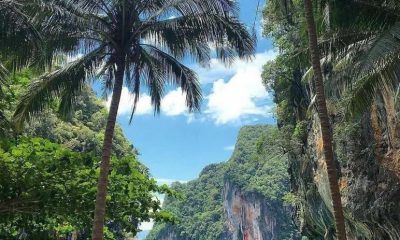
 Entertainment2 years ago
Entertainment2 years agoPhuket’s Tourist Case court division resumes after four-year break
-

 Entertainment1 year ago
Entertainment1 year agoSiam Paragon and Bangkok Pride proudly celebrates Pride Month from May 31 – June 4, 2024
-
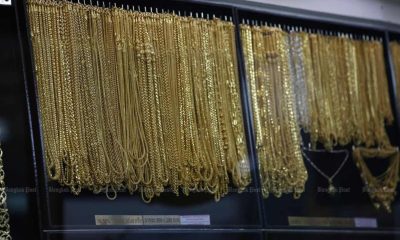
 Fashion2 years ago
Fashion2 years agoFed’s rate cut sends gold soaring past US$2,200 per ounce
-

 Fashion2 years ago
Fashion2 years agoFashion brands linked to brutal slaughter of reptiles in Thailand (video)
-
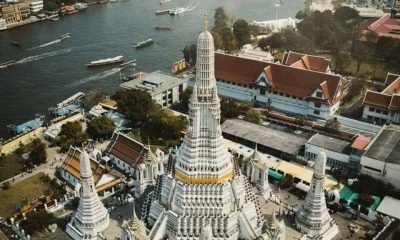
 Entertainment2 years ago
Entertainment2 years agoTrue Corporation partners with TAT to boost Thailand tourism
-

 Fashion2 years ago
Fashion2 years agoGold prices in Thailand surge with ornaments at 37,350 baht




